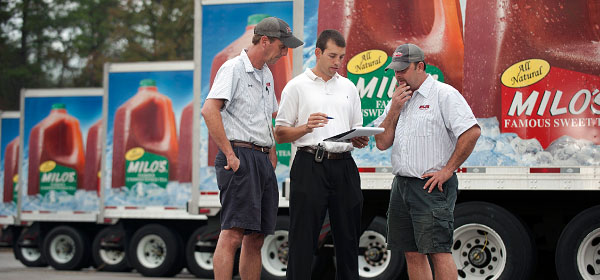Reliable In-Store Deliveries Fit to a Tea

Outsourcing its direct-to-store distribution to Ryder Supply Chain Solutions helped Milo’s Tea Company quench its customers’ thirst for better service.
THE CUSTOMER: Milo’s Tea Company, Birmingham, Alabama
Milo’s Tea is a leading tea manufacturer. It has distributed its Famous Sweet Tea for more than five decades.
THE PARTNER: Ryder Supply Chain Solutions
Ryder Supply Chain Solutions is an end-to-end logistics partner committed to helping companies transform their supply chains and achieve peak performance by delivering the best in operational execution. Ryder develops supply chain strategies, and manages and executes scalable logistics operations.
Milo’s Tea was running a private fleet of 12 small refrigerated trucks and 13 drivers to handle direct-to-store distribution (DSD) within a 100-mile radius of its production plant. The company had established business relationships with wholesale dairy distributors to manage deliveries beyond the local area.
Milo’s had expanded across the southeastern United States, with distribution in 13 states, but its private fleet was struggling to deliver to more than 330 locations within the DSD network, and to meet the stringent service requirements of large customers.
In 2008, Milo’s outsourced its fleet to Ryder under a dedicated contract carriage arrangement. Upgrading from straight trucks and vans to tractor-trailers trimmed the fleet’s size and weekly mileage significantly, and allowed Milo’s to make one or two weekly deliveries per store, depending on demand.
Given these parameters, Ryder’s optimization engine initially recommended six 28-foot tractor-trailer units and seven drivers. Ryder also provided all new drivers, because the larger vehicles required that drivers carry a commercial driver’s license.
Milo’s has realized a number of benefits in the two years since partnering with Ryder:
- Reduced costs. By resizing the equipment and fleet, Ryder cut weekly mileage from 7,000 to about 5,250 miles. The fuel, manpower, and mileage savings reduced overall DSD fleet operating costs by nearly 20 percent.
- Increased efficiency in managing seasonal surges. Ryder maintains a core fleet of equipment and drivers, supplementing it with resources as necessary to cover surges. The supplemental drivers are fully trained on Milo’s delivery procedures and routes. When the demand spike ends, the additional drivers and equipment return to other Ryder operations.
- Improved fleet and driver reliability. If a truck breaks down or a driver is sick, Ryder resolves the issue with little or no service disruption.
- Better information for better management. Ryder’s on-board computers gather information on every aspect of the operation. Ryder develops a weekly key performance indicator (KPI) report that tracks mileage, cost per case, cost per delivery, on-time performance, cases per delivery, fuel efficiency, and dunnage returns. These KPIs help Milo’s understand its unit costs.
- Tapping best practices. Milo’s benefits from Ryder’s experience running dedicated fleets. “We gain the valuable lessons Ryder has learned from other clients, and Ryder has the resources to act on those lessons,” says Jay Evers, Milo’s vice president and chief operating officer. “If they see an opportunity for improvement, they present us with a recommendation, so we can act on it immediately,” adds Mitch Wolfe, manager of sales and marketing at Milo’s.
“We didn’t have many late deliveries, but now we’ve completely eliminated them,” says Wolfe. “Our on-time delivery performance is 99.8 percent.”
Better service is helping Milo’s grow its business, even in the company’s mature DSD market.
